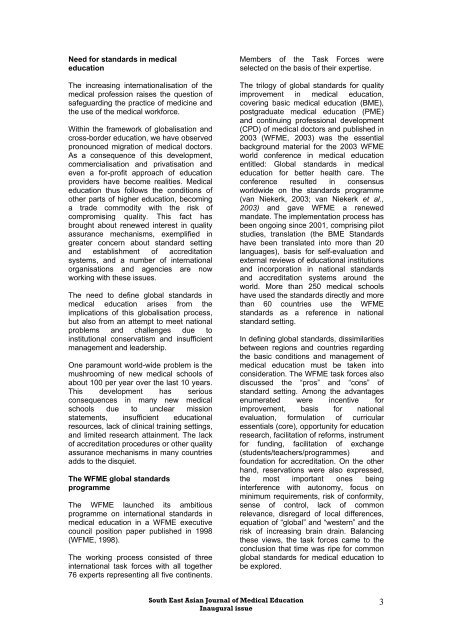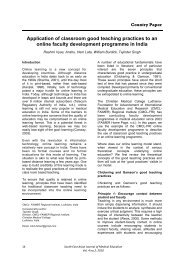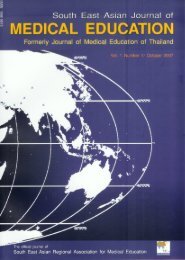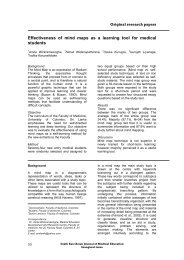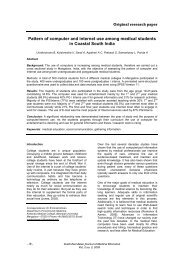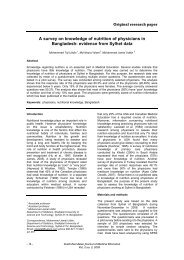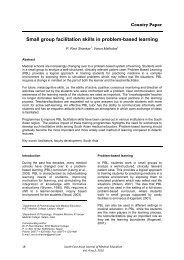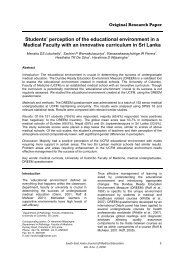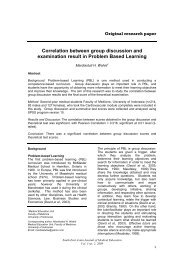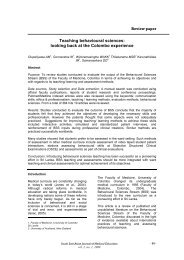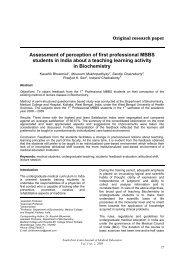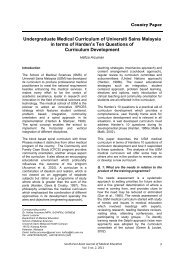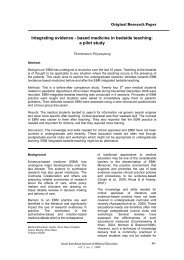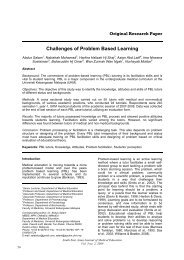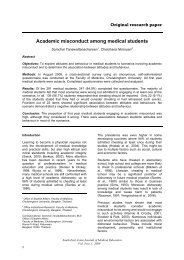Relevance of the WFME global standards in medical education to ...
Relevance of the WFME global standards in medical education to ...
Relevance of the WFME global standards in medical education to ...
Create successful ePaper yourself
Turn your PDF publications into a flip-book with our unique Google optimized e-Paper software.
Need for <strong>standards</strong> <strong>in</strong> <strong>medical</strong><br />
<strong>education</strong><br />
The <strong>in</strong>creas<strong>in</strong>g <strong>in</strong>ternationalisation <strong>of</strong> <strong>the</strong><br />
<strong>medical</strong> pr<strong>of</strong>ession raises <strong>the</strong> question <strong>of</strong><br />
safeguard<strong>in</strong>g <strong>the</strong> practice <strong>of</strong> medic<strong>in</strong>e and<br />
<strong>the</strong> use <strong>of</strong> <strong>the</strong> <strong>medical</strong> workforce.<br />
With<strong>in</strong> <strong>the</strong> framework <strong>of</strong> <strong>global</strong>isation and<br />
cross-border <strong>education</strong>, we have observed<br />
pronounced migration <strong>of</strong> <strong>medical</strong> doc<strong>to</strong>rs.<br />
As a consequence <strong>of</strong> this development,<br />
commercialisation and privatisation and<br />
even a for-pr<strong>of</strong>it approach <strong>of</strong> <strong>education</strong><br />
providers have become realities. Medical<br />
<strong>education</strong> thus follows <strong>the</strong> conditions <strong>of</strong><br />
o<strong>the</strong>r parts <strong>of</strong> higher <strong>education</strong>, becom<strong>in</strong>g<br />
a trade commodity with <strong>the</strong> risk <strong>of</strong><br />
compromis<strong>in</strong>g quality. This fact has<br />
brought about renewed <strong>in</strong>terest <strong>in</strong> quality<br />
assurance mechanisms, exemplified <strong>in</strong><br />
greater concern about standard sett<strong>in</strong>g<br />
and establishment <strong>of</strong> accreditation<br />
systems, and a number <strong>of</strong> <strong>in</strong>ternational<br />
organisations and agencies are now<br />
work<strong>in</strong>g with <strong>the</strong>se issues.<br />
The need <strong>to</strong> def<strong>in</strong>e <strong>global</strong> <strong>standards</strong> <strong>in</strong><br />
<strong>medical</strong> <strong>education</strong> arises from <strong>the</strong><br />
implications <strong>of</strong> this <strong>global</strong>isation process,<br />
but also from an attempt <strong>to</strong> meet national<br />
problems and challenges due <strong>to</strong><br />
<strong>in</strong>stitutional conservatism and <strong>in</strong>sufficient<br />
management and leadership.<br />
One paramount world-wide problem is <strong>the</strong><br />
mushroom<strong>in</strong>g <strong>of</strong> new <strong>medical</strong> schools <strong>of</strong><br />
about 100 per year over <strong>the</strong> last 10 years.<br />
This development has serious<br />
consequences <strong>in</strong> many new <strong>medical</strong><br />
schools due <strong>to</strong> unclear mission<br />
statements, <strong>in</strong>sufficient <strong>education</strong>al<br />
resources, lack <strong>of</strong> cl<strong>in</strong>ical tra<strong>in</strong><strong>in</strong>g sett<strong>in</strong>gs,<br />
and limited research atta<strong>in</strong>ment. The lack<br />
<strong>of</strong> accreditation procedures or o<strong>the</strong>r quality<br />
assurance mechanisms <strong>in</strong> many countries<br />
adds <strong>to</strong> <strong>the</strong> disquiet.<br />
The <strong>WFME</strong> <strong>global</strong> <strong>standards</strong><br />
programme<br />
The <strong>WFME</strong> launched its ambitious<br />
programme on <strong>in</strong>ternational <strong>standards</strong> <strong>in</strong><br />
<strong>medical</strong> <strong>education</strong> <strong>in</strong> a <strong>WFME</strong> executive<br />
council position paper published <strong>in</strong> 1998<br />
(<strong>WFME</strong>, 1998).<br />
The work<strong>in</strong>g process consisted <strong>of</strong> three<br />
<strong>in</strong>ternational task forces with all <strong>to</strong>ge<strong>the</strong>r<br />
76 experts represent<strong>in</strong>g all five cont<strong>in</strong>ents.<br />
Members <strong>of</strong> <strong>the</strong> Task Forces were<br />
selected on <strong>the</strong> basis <strong>of</strong> <strong>the</strong>ir expertise.<br />
The trilogy <strong>of</strong> <strong>global</strong> <strong>standards</strong> for quality<br />
improvement <strong>in</strong> <strong>medical</strong> <strong>education</strong>,<br />
cover<strong>in</strong>g basic <strong>medical</strong> <strong>education</strong> (BME),<br />
postgraduate <strong>medical</strong> <strong>education</strong> (PME)<br />
and cont<strong>in</strong>u<strong>in</strong>g pr<strong>of</strong>essional development<br />
(CPD) <strong>of</strong> <strong>medical</strong> doc<strong>to</strong>rs and published <strong>in</strong><br />
2003 (<strong>WFME</strong>, 2003) was <strong>the</strong> essential<br />
background material for <strong>the</strong> 2003 <strong>WFME</strong><br />
world conference <strong>in</strong> <strong>medical</strong> <strong>education</strong><br />
entitled: Global <strong>standards</strong> <strong>in</strong> <strong>medical</strong><br />
<strong>education</strong> for better health care. The<br />
conference resulted <strong>in</strong> consensus<br />
worldwide on <strong>the</strong> <strong>standards</strong> programme<br />
(van Niekerk, 2003; van Niekerk et al.,<br />
2003) and gave <strong>WFME</strong> a renewed<br />
mandate. The implementation process has<br />
been ongo<strong>in</strong>g s<strong>in</strong>ce 2001, compris<strong>in</strong>g pilot<br />
studies, translation (<strong>the</strong> BME Standards<br />
have been translated <strong>in</strong><strong>to</strong> more than 20<br />
languages), basis for self-evaluation and<br />
external reviews <strong>of</strong> <strong>education</strong>al <strong>in</strong>stitutions<br />
and <strong>in</strong>corporation <strong>in</strong> national <strong>standards</strong><br />
and accreditation systems around <strong>the</strong><br />
world. More than 250 <strong>medical</strong> schools<br />
have used <strong>the</strong> <strong>standards</strong> directly and more<br />
than 60 countries use <strong>the</strong> <strong>WFME</strong><br />
<strong>standards</strong> as a reference <strong>in</strong> national<br />
standard sett<strong>in</strong>g.<br />
In def<strong>in</strong><strong>in</strong>g <strong>global</strong> <strong>standards</strong>, dissimilarities<br />
between regions and countries regard<strong>in</strong>g<br />
<strong>the</strong> basic conditions and management <strong>of</strong><br />
<strong>medical</strong> <strong>education</strong> must be taken <strong>in</strong><strong>to</strong><br />
consideration. The <strong>WFME</strong> task forces also<br />
discussed <strong>the</strong> “pros” and “cons” <strong>of</strong><br />
standard sett<strong>in</strong>g. Among <strong>the</strong> advantages<br />
enumerated were <strong>in</strong>centive for<br />
improvement, basis for national<br />
evaluation, formulation <strong>of</strong> curricular<br />
essentials (core), opportunity for <strong>education</strong><br />
research, facilitation <strong>of</strong> reforms, <strong>in</strong>strument<br />
for fund<strong>in</strong>g, facilitation <strong>of</strong> exchange<br />
(students/teachers/programmes) and<br />
foundation for accreditation. On <strong>the</strong> o<strong>the</strong>r<br />
hand, reservations were also expressed,<br />
<strong>the</strong> most important ones be<strong>in</strong>g<br />
<strong>in</strong>terference with au<strong>to</strong>nomy, focus on<br />
m<strong>in</strong>imum requirements, risk <strong>of</strong> conformity,<br />
sense <strong>of</strong> control, lack <strong>of</strong> common<br />
relevance, disregard <strong>of</strong> local differences,<br />
equation <strong>of</strong> “<strong>global</strong>” and “western” and <strong>the</strong><br />
risk <strong>of</strong> <strong>in</strong>creas<strong>in</strong>g bra<strong>in</strong> dra<strong>in</strong>. Balanc<strong>in</strong>g<br />
<strong>the</strong>se views, <strong>the</strong> task forces came <strong>to</strong> <strong>the</strong><br />
conclusion that time was ripe for common<br />
<strong>global</strong> <strong>standards</strong> for <strong>medical</strong> <strong>education</strong> <strong>to</strong><br />
be explored.<br />
South East Asian Journal <strong>of</strong> Medical Education<br />
Inaugural issue<br />
3


